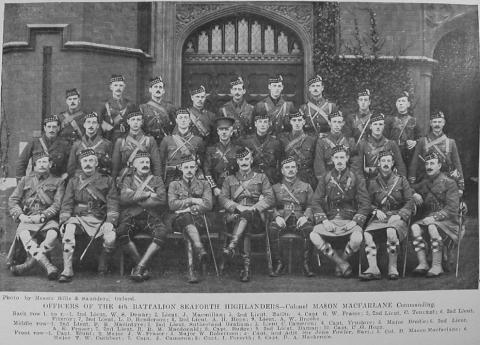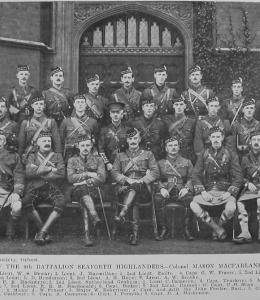Killed in action aged 25
Grave unknown
Andrew Knowles was born in Sheffield, the eldest son of Colonel James Wilson Fraser C.M.G., O.B.E of Leckmelm, Garve, Ross-shire and his wife Edith.

Source : The Sword Of The North Highland Memories Of The Great War –
Dugald MacEchern
Andrew was educated at Winchester and came up to Christ Church in 1911 where he was a member of the University Contingent of the Officers’ Training Corps. He commenced Service on 3 August 1914 and served in the ranks before being commissioned Captain in 3rd Company 4th Battalion Seaforth Highlanders. He was killed in action at Fountaine Notre Dame, was awarded the Military Cross on 1 January 1918, and is commemorated on Panel 10 on the Cambrai Memorial at Louverval.
Extract from 'The North Star' of Saturday, 14 March 1925
The Battalion was the first of the Seaforth and Cameron Brigade, and one of the first of all the Territorial Battalions of the country to be sent to the front in France, Colonel Fraser of Leckmelm, in asking Provost Crawford, as representing the Burgh of Dingwall, to accept the custody of the Memorial on behalf of the 4th Seaforth Re-union Club of 1914-1918, said that the Royal Burgh of Dingwall had many distinctions in the past, but he felt that the burgh had cause to feel that these distinctions had been enhanced during the Great War by association with the County Territorial Battalion. Col. Fraser then related the heroic exploits of the 4th Seaforths in the Cambrai struggles of the close of 1917 as told him by one who took part in the memorable fighting, who had been handing up the ammunition to one of his officers, a skilled shot, who single-handed held a hot corner until he fell, shot through the heart.
They therefore, on behalf of the TH Battalion, The Seaforth Highlanders Re-union Club, 1914-18, asked the Provost of Dingwall to take over the Memorial for safe keeping in all time coming. This part of the proceedings closed with a Lament played by the pipers and the Last Post sounded by the buglers. It was a deeply moving close to a touching ceremony.
Andrew’s name is on the Memorial to the 4th Seaforths near Dingwall station from which they left to go to France.

